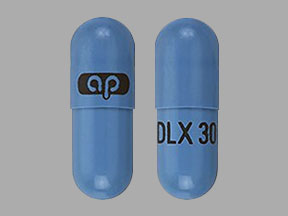Duloxetine Interactions
There are 635 drugs known to interact with duloxetine, along with 10 disease interactions, and 2 alcohol/food interactions. Of the total drug interactions, 109 are major, 503 are moderate, and 23 are minor.
- View all 635 medications that may interact with duloxetine
- View duloxetine alcohol/food interactions (2)
- View duloxetine disease interactions (10)
Most frequently checked interactions
View interaction reports for duloxetine and the medicines listed below.
- Abilify (aripiprazole)
- Adderall (amphetamine / dextroamphetamine)
- Aspir 81 (aspirin)
- Aspirin Low Strength (aspirin)
- Benadryl (diphenhydramine)
- Celebrex (celecoxib)
- CoQ10 (ubiquinone)
- Eliquis (apixaban)
- Fish Oil (omega-3 polyunsaturated fatty acids)
- Flonase (fluticasone nasal)
- Iron Sulfate (ferrous sulfate)
- Jardiance (empagliflozin)
- Linzess (linaclotide)
- Lyrica (pregabalin)
- Metoprolol Succinate ER (metoprolol)
- Metoprolol Tartrate (metoprolol)
- MiraLAX (polyethylene glycol 3350)
- Norco (acetaminophen / hydrocodone)
- Ozempic (semaglutide)
- ProAir HFA (albuterol)
- Symbicort (budesonide / formoterol)
- Synthroid (levothyroxine)
- Tylenol (acetaminophen)
- Vitamin B12 (cyanocobalamin)
- Vitamin C (ascorbic acid)
- Vitamin D2 (ergocalciferol)
- Vitamin D3 (cholecalciferol)
- Vyvanse (lisdexamfetamine)
- Xanax (alprazolam)
- Zyrtec (cetirizine)
Duloxetine alcohol/food interactions
There are 2 alcohol/food interactions with duloxetine.
Duloxetine disease interactions
There are 10 disease interactions with duloxetine which include:
- liver disease
- renal disease
- depression
- diabetes
- glaucoma
- hypertension
- hyponatremia
- mania
- seizures
- urinary tract obstruction
More about duloxetine
- duloxetine consumer information
- Compare alternatives
- Pricing & coupons
- Reviews (2,474)
- Drug images
- Side effects
- Dosage information
- Patient tips
- During pregnancy
- Support group
- Drug class: serotonin-norepinephrine reuptake inhibitors
- Breastfeeding
- En español
Related treatment guides
Drug Interaction Classification
| Highly clinically significant. Avoid combinations; the risk of the interaction outweighs the benefit. | |
| Moderately clinically significant. Usually avoid combinations; use it only under special circumstances. | |
| Minimally clinically significant. Minimize risk; assess risk and consider an alternative drug, take steps to circumvent the interaction risk and/or institute a monitoring plan. | |
| No interaction information available. |
See also:
Further information
Always consult your healthcare provider to ensure the information displayed on this page applies to your personal circumstances.


